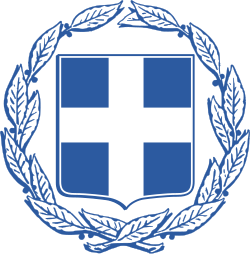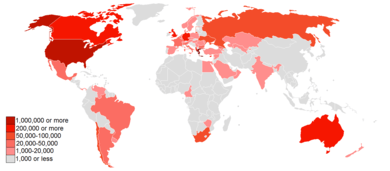Greeks in Germany
The Greeks in Germany form a significant community with a population of roughly 348,475 people having Greek Citizenship according to the Federal Statistical Office of Germany, on December 31, 2016. Some 274,060 of these were born in Greece and 74,415 were born in Germany.[1]. About 443,000 people of Greek ethnic origin are estimated to live in Germany according to the 2016 Statistical Yearbook.[2]. The number varies significantly in other estimations, as the Federal Foreign Office of Germany gives an estimated population of 320,000 people,[3] while the Ministry of Foreign Affairs of Greece steps it up to 380,000.[4].
 Distribution of Greek nationals in Germany | |
| Total population | |
|---|---|
| 2016, Greek Ethnic Origin 443,000 2016, Greek Citizens 348,475 2016, Born in Greece 274,060 2016, Born in Germany 74,415 | |
| Regions with significant populations | |
| Frankfurt Rhine Main Region, Munich, Stuttgart, Düsseldorf, Bielefeld | |
| Languages | |
| German, Greek | |
| Religion | |
| Predominantly Greek Orthodox Church |
History
Significant immigration from Greece to Germany started around 1700, when the Ottoman Empire opened its borders. The first community was found in Leipzig at this time.
The second wave of immigration was when Otto of Wittelbach became King of Greece as Otto of Greece. Many Greeks came as students to Bavaria.
The Greek population of today came mostly after World War II. West Germany needed employees for their expanding industry. In East Germany, Greek communists came as political refugees until 1973.
Many Greeks were relocated to German Democratic Republic during the Greek Civil War.
Education
The first Greek schools were created because of the number of Greeks immigrating over to Germany. Since the first Greek school built in 1960 and up until 1990, over 1 million Greeks had immigrated to Germany. About 800,000 of those Greeks had after either a long-term or a short term stay had gone back to Greece. Nowadays, every fifth of an estimated 47,000 students of Greek origin attends one of 35 Greek schools in Germany.
Demographics
The first Greeks came during the time of the Roman Empire to Central Europe. Among the major German cities Offenbach am Main and Stuttgart had the highest share of Greek migrants in 2011 according to German Census data. [5] Munich was home to the largest Greek community in Germany. According to the same census, there are also large Greek diaspora communities in Nordrhein-Westfalen, especially in Düsseldorf and Bielefeld.



| Year | Pop. | ±% |
|---|---|---|
| 1967 | 200,951 | — |
| 1968 | 211,764 | +5.4% |
| 1969 | 271,313 | +28.1% |
| 1970 | 342,891 | +26.4% |
| 1971 | 354,949 | +3.5% |
| 1972 | 389,426 | +9.7% |
| 1973 | 407,614 | +4.7% |
| 1974 | 406,394 | −0.3% |
| 1975 | 390,455 | −3.9% |
| 1976 | 353,733 | −9.4% |
| 1977 | 328,465 | −7.1% |
| 1978 | 305,523 | −7.0% |
| 1979 | 296,803 | −2.9% |
| 1980 | 297,518 | +0.2% |
| 1981 | 299,300 | +0.6% |
| 1982 | 300,824 | +0.5% |
| 1983 | 292,349 | −2.8% |
| 1984 | 287,099 | −1.8% |
| 1985 | 280,614 | −2.3% |
| 1986 | 278,506 | −0.8% |
| 1987 | 256,396 | −7.9% |
| 1988 | 274,793 | +7.2% |
| 1989 | 293,649 | +6.9% |
| 1990 | 320,181 | +9.0% |
| 1991 | 336,893 | +5.2% |
| 1992 | 345,902 | +2.7% |
| 1993 | 351,976 | +1.8% |
| 1994 | 355,583 | +1.0% |
| 1995 | 359,556 | +1.1% |
| 1996 | 362,539 | +0.8% |
| 1997 | 363,202 | +0.2% |
| 1998 | 363,514 | +0.1% |
| 1999 | 364,354 | +0.2% |
| 2000 | 365,438 | +0.3% |
| 2001 | 362,708 | −0.7% |
| 2002 | 359,361 | −0.9% |
| 2003 | 354,630 | −1.3% |
| 2004 | 315,989 | −10.9% |
| 2005 | 309,794 | −2.0% |
| 2006 | 303,761 | −1.9% |
| 2007 | 294,891 | −2.9% |
| 2008 | 287,187 | −2.6% |
| 2009 | 278,063 | −3.2% |
| 2010 | 276,685 | −0.5% |
| 2011 | 283,684 | +2.5% |
| 2012 | 298,254 | +5.1% |
| 2013 | 316,331 | +6.1% |
| 2014 | 328,564 | +3.9% |
| 2015 | 339,931 | +3.5% |
| 2016 | 348,475 | +2.5% |
| 2017 | 362,245 | +4.0% |
| 2018 | 363,205 | +0.3% |
| 2019 | 363,650 | +0.1% |
Muslims from Greece
There are some members of the Muslim minority of Greece among the some 350,000 Greeks living in Germany who are ethnic Turks or who espouse a Turkish identity.[7] The majority of Turks immigrated from Western Thrace.[8] In the 1960s and 1970s, the Thracian tobacco industry was affected by a severe crisis and many tobacco growers lost their income. This resulted in many Muslims leaving their homes and immigrating to Germany with estimates suggesting that today there are now between 12,000[9] and 25,000[10] residing in Germany.
Notable people
- Theophano (960-991) - Empress of Holy Roman Empire, Wife of Otto II.
- John Argyris (1913-2004) - was among the creators of the Finite Element Method (FEM)
- Daniela Amavia - actress and model
- Adam Bousdoukos- from Soul Kitchen
- Constantin Carathéodory - mathematician
- Miltiades Caridis - conductor
- Costa Cordalis - singer/songwriter
- Giorgos Donis - footballer
- Margaritis Dimitsas (1830-1903) - geographer
- Artemis Gounaki - singer/songwriter
- LaFee - singer/songwriter
- Georg Anton Jasmatzi (1847-1922) - founder of the Jasmatzi tabac factory (later sold to British American Tobacco)
- Aris Kalaizis - painter
- Panajotis Kondylis (1943-1998) - philosopher
- Jonas Kyratzes - video game designer
- Vicky Leandros - singer
- Pierre Mavrogordatos (1870-1948) - archaeologist
- Ioannis Masmanidis - footballer
- Kostantinos Mitroglou - footballer
- Argyris Nastópoulos - singer
- Demis Nikolaidis - footballer
- Antonis Remos - singer
- Susan Sideropoulos- singer and actress
- Despina Vandi - singer
- Anastasia Zampounidis - broadcaster
- Linda Zervakis - newscaster (Tagesschau)
- Xaris & Panos Katsimihas - singers, songwriters, composers
- Odisseas Vlachodimos - footballer
- Panagiotis Vlachodimos - footballer
- Shindy - rapper
- Ioannis Panousis - Author, Law Enforcement Specialist
See also
- German-Greek relations
- Greek diaspora
References
- https://www.destatis.de/EN/FactsFigures/SocietyState/Population/MigrationIntegration/Tables_PersonsMigrationBackground/MigrantStatusSelectedCountries.html
- "Greece". Federal Foreign Office of Germany. Retrieved 2009-01-18.
- "Germany". Ministry of Foreign Affairs of Greece. Archived from the original on 2009-08-01. Retrieved 2009-01-18.
- "Kartenseite: Griechen in Deutschland - Landkreise". kartenseite.wordpress.com. 2017-03-26. Retrieved 2017-04-23.
- Knerr, Béatrice (2006). Vorweggenommene Erweiterungen: Wanderungsbewegungen aus Grenzgebieten in die EU. ISBN 9783899582819.
- Westerlund & Svanberg 1999, 320-321.
- Council of Europe: Parliamentary Assembly 2007, 118.
- Clogg 2002, 84.
- International Assembly of Western Thrace Turks. "POLITICAL AND CIVIL ORGANISATION COMMISSION". Archived from the original on 2011-07-21. Retrieved 2010-05-19.
Bibliography
- Clogg, Richard (2002). Minorities in Greece: Aspects of a Plural Society. C. Hurst & Co. Publishers. ISBN 1-85065-705-X.CS1 maint: ref=harv (link).
- Council of Europe: Parliamentary Assembly (2007). Parliamentary Assembly: Working Papers 2007 Ordinary Session 22–26 January 2007. Council of Europe. ISBN 978-92-871-6191-8.CS1 maint: ref=harv (link).
- Westerlund, David; Svanberg, Ingvar (1999). Islam Outside the Arab World. Palgrave Macmillan. ISBN 0-312-22691-8.CS1 maint: ref=harv (link).
Further reading
- Troebst, Stefan (September 2004). "Evacuation to a cold country: child refugees from the Greek Civil War in the German Democratic Republic, 1949-1989". Nationalities Papers. 32 (3): 675–691. doi:10.1080/0090599042000246442.CS1 maint: ref=harv (link)

